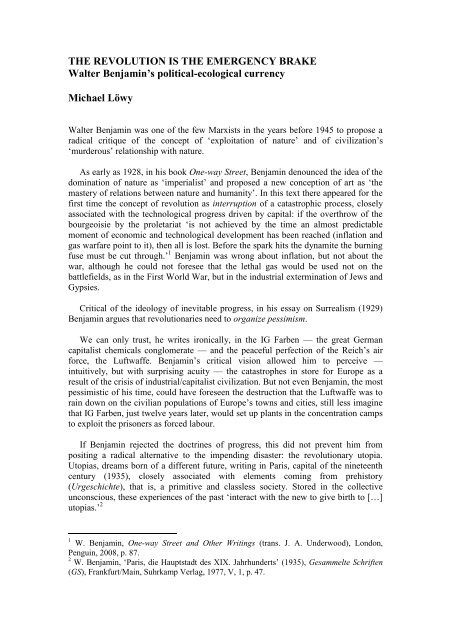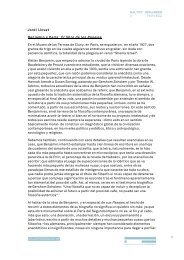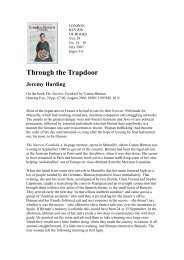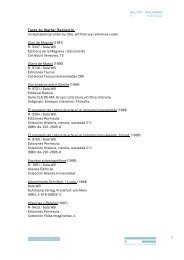the revolution is the emergency brake - Walter Benjamin a Portbou
the revolution is the emergency brake - Walter Benjamin a Portbou
the revolution is the emergency brake - Walter Benjamin a Portbou
You also want an ePaper? Increase the reach of your titles
YUMPU automatically turns print PDFs into web optimized ePapers that Google loves.
THE REVOLUTION IS THE EMERGENCY BRAKE<br />
<strong>Walter</strong> <strong>Benjamin</strong>’s political-ecological currency<br />
Michael Löwy<br />
<strong>Walter</strong> <strong>Benjamin</strong> was one of <strong>the</strong> few Marx<strong>is</strong>ts in <strong>the</strong> years before 1945 to propose a<br />
radical critique of <strong>the</strong> concept of „exploitation of nature‟ and of civilization‟s<br />
„murderous‟ relationship with nature.<br />
As early as 1928, in h<strong>is</strong> book One-way Street, <strong>Benjamin</strong> denounced <strong>the</strong> idea of <strong>the</strong><br />
domination of nature as „imperial<strong>is</strong>t‟ and proposed a new conception of art as „<strong>the</strong><br />
mastery of relations between nature and humanity‟. In th<strong>is</strong> text <strong>the</strong>re appeared for <strong>the</strong><br />
first time <strong>the</strong> concept of <strong>revolution</strong> as interruption of a catastrophic process, closely<br />
associated with <strong>the</strong> technological progress driven by capital: if <strong>the</strong> overthrow of <strong>the</strong><br />
bourgeo<strong>is</strong>ie by <strong>the</strong> proletariat „<strong>is</strong> not achieved by <strong>the</strong> time an almost predictable<br />
moment of economic and technological development has been reached (inflation and<br />
gas warfare point to it), <strong>the</strong>n all <strong>is</strong> lost. Before <strong>the</strong> spark hits <strong>the</strong> dynamite <strong>the</strong> burning<br />
fuse must be cut through.‟ 1 <strong>Benjamin</strong> was wrong about inflation, but not about <strong>the</strong><br />
war, although he could not foresee that <strong>the</strong> lethal gas would be used not on <strong>the</strong><br />
battlefields, as in <strong>the</strong> First World War, but in <strong>the</strong> industrial extermination of Jews and<br />
Gypsies.<br />
Critical of <strong>the</strong> ideology of inevitable progress, in h<strong>is</strong> essay on Surreal<strong>is</strong>m (1929)<br />
<strong>Benjamin</strong> argues that <strong>revolution</strong>aries need to organize pessim<strong>is</strong>m.<br />
We can only trust, he writes ironically, in <strong>the</strong> IG Farben — <strong>the</strong> great German<br />
capital<strong>is</strong>t chemicals conglomerate — and <strong>the</strong> peaceful perfection of <strong>the</strong> Reich‟s air<br />
force, <strong>the</strong> Luftwaffe. <strong>Benjamin</strong>‟s critical v<strong>is</strong>ion allowed him to perceive —<br />
intuitively, but with surpr<strong>is</strong>ing acuity — <strong>the</strong> catastrophes in store for Europe as a<br />
result of <strong>the</strong> cr<strong>is</strong><strong>is</strong> of industrial/capital<strong>is</strong>t civilization. But not even <strong>Benjamin</strong>, <strong>the</strong> most<br />
pessim<strong>is</strong>tic of h<strong>is</strong> time, could have foreseen <strong>the</strong> destruction that <strong>the</strong> Luftwaffe was to<br />
rain down on <strong>the</strong> civilian populations of Europe‟s towns and cities, still less imagine<br />
that IG Farben, just twelve years later, would set up plants in <strong>the</strong> concentration camps<br />
to exploit <strong>the</strong> pr<strong>is</strong>oners as forced labour.<br />
If <strong>Benjamin</strong> rejected <strong>the</strong> doctrines of progress, th<strong>is</strong> did not prevent him from<br />
positing a radical alternative to <strong>the</strong> impending d<strong>is</strong>aster: <strong>the</strong> <strong>revolution</strong>ary utopia.<br />
Utopias, dreams born of a different future, writing in Par<strong>is</strong>, capital of <strong>the</strong> nineteenth<br />
century (1935), closely associated with elements coming from preh<strong>is</strong>tory<br />
(Urgeschichte), that <strong>is</strong>, a primitive and classless society. Stored in <strong>the</strong> collective<br />
unconscious, <strong>the</strong>se experiences of <strong>the</strong> past „interact with <strong>the</strong> new to give birth to […]<br />
utopias.‟ 2<br />
1<br />
W. <strong>Benjamin</strong>, One-way Street and O<strong>the</strong>r Writings (trans. J. A. Underwood), London,<br />
Penguin, 2008, p. 87.<br />
2<br />
W. <strong>Benjamin</strong>, „Par<strong>is</strong>, die Hauptstadt des XIX. Jahrhunderts‟ (1935), Gesammelte Schriften<br />
(GS), Frankfurt/Main, Suhrkamp Verlag, 1977, V, 1, p. 47.
In h<strong>is</strong> 1935 essay on Bachofen, <strong>Benjamin</strong> develops <strong>the</strong> reference to preh<strong>is</strong>tory in<br />
more specific terms. Friedrich Engels was greatly interested in Bachofen‟s work on<br />
matriarchy, while for <strong>the</strong> anarch<strong>is</strong>t thinker Él<strong>is</strong>ée Reclus <strong>the</strong> interest lay in <strong>the</strong><br />
„evocation of a commun<strong>is</strong>t society at <strong>the</strong> dawn of h<strong>is</strong>tory‟, a classless, democratic and<br />
egalitarian society which implied a genuine „subversion of <strong>the</strong> principle of authority‟. 3<br />
Archaic societies also lived in greater harmony with nature. In „The Par<strong>is</strong> of <strong>the</strong><br />
Second Empire in Baudelaire‟ (1938) <strong>Benjamin</strong> calls into question <strong>the</strong> „mastery‟<br />
(Beherrschung) of nature and its „exploitation‟ (Ausbeutung) by humans. As<br />
Bachofen had already shown, <strong>Benjamin</strong> ins<strong>is</strong>ts, „<strong>the</strong> murderous (mörder<strong>is</strong>ch) idea of<br />
<strong>the</strong> exploitation of nature‟ — a dominant capital<strong>is</strong>t/modern concept from <strong>the</strong> 19th<br />
century on — did not ex<strong>is</strong>t in matriarchal societies because nature was perceived as a<br />
generous mo<strong>the</strong>r (schenkenden Mutter). 4<br />
For <strong>Benjamin</strong> — as for Engels and <strong>the</strong> libertarian social<strong>is</strong>t Él<strong>is</strong>ée Reclus — it was<br />
a question not of a return to <strong>the</strong> preh<strong>is</strong>toric past but of putting forward <strong>the</strong> prospect of<br />
a new harmony between society and <strong>the</strong> natural environment. The name that sums up<br />
for <strong>Benjamin</strong> <strong>the</strong> prom<strong>is</strong>e of such future reconciliation with nature <strong>is</strong> Fourier. Only in<br />
a social<strong>is</strong>t society in which production will no longer be based on <strong>the</strong> exploitation of<br />
human labour, „work […] would no longer be characterized as <strong>the</strong> exploitation of<br />
nature by man. It would be conducted on <strong>the</strong> model of children‟s play, which in<br />
Fourier forms <strong>the</strong> bas<strong>is</strong> of <strong>the</strong> “impassioned work” of <strong>the</strong> Harmonians […] Such<br />
work invested with <strong>the</strong> spirit of play <strong>is</strong> oriented not towards <strong>the</strong> production of values<br />
but towards <strong>the</strong> improvement of nature.‟ 5<br />
In <strong>the</strong> Theses „On <strong>the</strong> Concept of H<strong>is</strong>tory‟ (1940), h<strong>is</strong> philosophical testament,<br />
<strong>Benjamin</strong> once again hails Fourier as <strong>the</strong> utopian v<strong>is</strong>ionary of „a labour that, far from<br />
exploiting nature, <strong>is</strong> capable of extracting from it <strong>the</strong> virtual creations that lie dormant<br />
in her womb‟ (Thes<strong>is</strong> XI). Th<strong>is</strong> <strong>is</strong> not to say that <strong>Benjamin</strong> wanted to replace<br />
Marx<strong>is</strong>m with utopian social<strong>is</strong>m: he regarded Fourier as a supplement Marx, and in<br />
<strong>the</strong> same passage in which he speaks so highly of <strong>the</strong> French Social<strong>is</strong>t invokes Marx‟s<br />
observations on <strong>the</strong> Gotha Programme‟s conform<strong>is</strong>t stance on <strong>the</strong> nature of work. For<br />
social-democratic positiv<strong>is</strong>m — typified by Joseph Dietzgen — „<strong>the</strong> new conception<br />
of labour amounts to <strong>the</strong> exploitation of nature, which with naive complacency <strong>is</strong><br />
contrasted with <strong>the</strong> exploitation of <strong>the</strong> proletariat‟. Th<strong>is</strong> <strong>is</strong> „a conception of nature<br />
which differs ominously from <strong>the</strong> one in <strong>the</strong> Social<strong>is</strong>t utopias before <strong>the</strong> 1848<br />
<strong>revolution</strong>‟ and one which „already d<strong>is</strong>plays <strong>the</strong> technocratic features later<br />
encountered in Fasc<strong>is</strong>m‟. 6<br />
We find in <strong>the</strong> Theses of 1940 a correspondence — in <strong>the</strong> sense Baudelaire gives<br />
to <strong>the</strong> term in h<strong>is</strong> poem „Les Correspondences‟ — between <strong>the</strong>ology and politics:<br />
between <strong>the</strong> lost parad<strong>is</strong>e from which we have been driven by <strong>the</strong> storm called<br />
„progress‟ and <strong>the</strong> classless society at <strong>the</strong> dawn of h<strong>is</strong>tory, an also between <strong>the</strong><br />
3 W. <strong>Benjamin</strong>, „Johann Jakob Bachofen‟, (1935), GS II, 1, pp. 220-230.<br />
4 W. <strong>Benjamin</strong>, „Das Passagen-Werk‟, GS VI, 1, p. 456.<br />
5 „Das Passagen-Werk‟, I, p. 47<br />
6 As I quote from „On <strong>the</strong> Concept of H<strong>is</strong>tory‟ in my book Fire Alarm (trans. Chr<strong>is</strong> Turner),<br />
London, Verso, 2005.
Messianic age of <strong>the</strong> future and <strong>the</strong> new classless society of social<strong>is</strong>m. But how are<br />
we to interrupt <strong>the</strong> ongoing catastrophe, <strong>the</strong> accumulation of debr<strong>is</strong> which „grows<br />
skyward‟, <strong>the</strong> result of so-called „progress‟ (Thes<strong>is</strong> IX)? As always in <strong>the</strong> Theses of<br />
1940, <strong>Benjamin</strong>‟s answer <strong>is</strong> both religious and secular. In <strong>the</strong> <strong>the</strong>ological sphere, it <strong>is</strong><br />
<strong>the</strong> task of <strong>the</strong> Messiah, while <strong>the</strong> secular equivalent or „correspondence‟ to Messianic<br />
intervention <strong>is</strong> none o<strong>the</strong>r than <strong>the</strong> Revolution. The Messianic/<strong>revolution</strong>ary<br />
interruption of progress <strong>is</strong>, <strong>the</strong>n, <strong>Benjamin</strong>‟s response to <strong>the</strong> threats posed by <strong>the</strong><br />
human species by <strong>the</strong> continuation of evil and impending storm of new catastrophes.<br />
We are in 1940, only months away from <strong>the</strong> start of <strong>the</strong> Final Solution.<br />
In <strong>the</strong> Theses „On <strong>the</strong> Concept of H<strong>is</strong>tory‟ <strong>Benjamin</strong> makes frequent reference to<br />
Marx, but at one important point adopts a critical d<strong>is</strong>tance from <strong>the</strong> author of Capital:<br />
„Marx said that <strong>revolution</strong>s are <strong>the</strong> locomotive of world h<strong>is</strong>tory. But perhaps things<br />
are very different. It may be that <strong>revolution</strong>s are <strong>the</strong> act by which <strong>the</strong> human race<br />
travelling in <strong>the</strong> train applies <strong>the</strong> <strong>emergency</strong> <strong>brake</strong>.‟ 7 Implicitly, <strong>the</strong> image suggests<br />
that if humanity allows <strong>the</strong> train follow its course, already laid down by <strong>the</strong> steel<br />
structure of <strong>the</strong> rails, and nothing stops its vertiginous career, we shall be hurled into<br />
catastrophe, <strong>the</strong> crash or <strong>the</strong> abyss.<br />
But even so, <strong>Benjamin</strong>, <strong>the</strong> most pessim<strong>is</strong>tic of Marx<strong>is</strong>ts, could not foresee how far<br />
<strong>the</strong> process of capital<strong>is</strong>t exploitation and domination of nature — and its bureaucratic<br />
double in <strong>the</strong> countries of <strong>the</strong> East before <strong>the</strong> fall of <strong>the</strong> Wall — would have<br />
catastrophic consequences for all humanity.<br />
* * *<br />
Some comments on <strong>the</strong> political-ecological currency of <strong>Benjamin</strong>’s thinking<br />
We are witnessing now in <strong>the</strong> early twenty-first century <strong>the</strong> ever faster „progress‟ of<br />
<strong>the</strong> train of industrial/capital<strong>is</strong>t civilization into <strong>the</strong> abyss, an abyss called ecological<br />
d<strong>is</strong>aster, <strong>the</strong> most dramatic expression of which <strong>is</strong> global warming. It <strong>is</strong> important to<br />
bear in mind <strong>the</strong> increasing acceleration of <strong>the</strong> train, <strong>the</strong> dizzying speed at which it <strong>is</strong><br />
racing towards d<strong>is</strong>aster.<br />
A few years ago, when one referred to <strong>the</strong> dangers of ecological catastrophe, it was<br />
in <strong>the</strong> d<strong>is</strong>tant future, perhaps at <strong>the</strong> end of <strong>the</strong> 21 st century. Hans Jonas, in The<br />
Imperative of Responsibility, called on us to protect <strong>the</strong> lives of generations yet<br />
unborn. Now, though, <strong>the</strong> process of climate change has accelerated to <strong>the</strong> point that<br />
we are d<strong>is</strong>cussing what will happen in <strong>the</strong> next few decades; in fact, <strong>the</strong> catastrophe<br />
has already begun and we are in a race against time to try to impede, slow down and<br />
contain th<strong>is</strong> d<strong>is</strong>astrous process, which will result not only in <strong>the</strong> ra<strong>is</strong>ing of <strong>the</strong> planet‟s<br />
temperature but <strong>the</strong> desertification of vast areas, <strong>the</strong> r<strong>is</strong>ing of sea levels and <strong>the</strong><br />
7 W. <strong>Benjamin</strong>, GS I, 3, p. 1232. Th<strong>is</strong> <strong>is</strong> one of <strong>the</strong> preparatory notes to „On <strong>the</strong> Concept of<br />
H<strong>is</strong>tory‟, which does not appear in <strong>the</strong> final versions of <strong>the</strong> document. The passage from<br />
Marx to which <strong>Benjamin</strong> refers appears in The Civil War in France: „Die Revolutionen sind<br />
die Lokomotiven der Geschichte‟ (<strong>the</strong> word „world‟ does not appear in Marx‟s text).
d<strong>is</strong>appearance under <strong>the</strong> waves of coastal cities: Venice, Amsterdam, Hong Kong and<br />
Rio de Janeiro.<br />
It <strong>is</strong> not a matter of <strong>the</strong> „bad will‟ of th<strong>is</strong> or that multinational or government, but<br />
of <strong>the</strong> intrinsically perverse logic of <strong>the</strong> capital<strong>is</strong>t system based on unlimited<br />
expansion — what Hegel called „bad infinity‟ — and <strong>the</strong> unlimited accumulation of<br />
goods, capital, profits: a logic that <strong>is</strong> inevitably destructive of <strong>the</strong> environment and<br />
responsible for climate change.<br />
The United Nations Conference on Climate Change in Copenhagen (December<br />
2009) illustrates <strong>the</strong> inability or lack of interest of <strong>the</strong> capital<strong>is</strong>t powers to address <strong>the</strong><br />
dramatic challenge of global warming.<br />
Partial reforms are completely inadequate. What <strong>is</strong> at <strong>is</strong>sue <strong>is</strong> <strong>the</strong> need for a<br />
<strong>revolution</strong>ary interruption: to stop <strong>the</strong> train of modern industrial/capital<strong>is</strong>t civilization<br />
before it reaches <strong>the</strong> abyss. In o<strong>the</strong>r words, it <strong>is</strong> necessary to replace <strong>the</strong><br />
microrationality of profits with a social and ecological macrorationality, which<br />
requires a shift in <strong>the</strong> paradigm of civilization.<br />
We need a much more radical and profound v<strong>is</strong>ion of what a <strong>revolution</strong> <strong>is</strong>. It <strong>is</strong> a<br />
matter of changing not only relations of production, property relations, but <strong>the</strong> very<br />
structure of <strong>the</strong> forces of production, <strong>the</strong> structure of <strong>the</strong> productive apparatus. The<br />
same logic must be applied to th<strong>is</strong> apparatus that Marx used in relation to <strong>the</strong> state<br />
apparatus on <strong>the</strong> bas<strong>is</strong> of <strong>the</strong> experience of <strong>the</strong> Par<strong>is</strong> Commune. According to Marx,<br />
workers cannot appropriate <strong>the</strong> apparatus of <strong>the</strong> bourgeo<strong>is</strong> state and make it serve <strong>the</strong><br />
proletariat; <strong>the</strong>y need to destroy it and create a different kind of power. The same<br />
logic can be applied to <strong>the</strong> ex<strong>is</strong>ting — capital<strong>is</strong>t — system of production: it has to be,<br />
if not destroyed, at least radically transformed. In its current structure and functioning<br />
— based on fossil fuels — it <strong>is</strong> ecologically unsustainable. The socio-ecological<br />
<strong>revolution</strong> implies a profound reorientation of technology that will replace ex<strong>is</strong>ting<br />
energy sources with o<strong>the</strong>r, non-polluting, renewable sources such as wind or solar<br />
polar; indeed, some ecosocial<strong>is</strong>ts speak of „solar commun<strong>is</strong>m‟, seeing an elective<br />
affinity between <strong>the</strong> (free) energy of <strong>the</strong> sun and social<strong>is</strong>m.<br />
The first question to be addressed, <strong>the</strong>n, <strong>is</strong> that of control of <strong>the</strong> means of<br />
production, and especially dec<strong>is</strong>ions about investment and technological change; such<br />
means and dec<strong>is</strong>ions should be taken away from <strong>the</strong> banks and venture capital<strong>is</strong>ts to<br />
become <strong>the</strong> communal property of society. Clearly, radical change involves not only<br />
production but also consumption. However, <strong>the</strong> problem of bourgeo<strong>is</strong>/industrial<br />
civilization <strong>is</strong> not, as environmental<strong>is</strong>ts often claim, <strong>the</strong> „excessive consumption‟ of<br />
<strong>the</strong> population, and <strong>the</strong> solution <strong>is</strong> not a general „limiting‟ of consumption, first and<br />
foremost in <strong>the</strong> advanced capital<strong>is</strong>t countries. It <strong>is</strong> <strong>the</strong> nature of present-day<br />
consumption, based on ostentation and waste, mercantile alienation and obsessive<br />
accumulation, which needs to be questioned.<br />
What <strong>is</strong> needed <strong>is</strong> <strong>the</strong> full-scale reorganization of <strong>the</strong> mode of production and<br />
consumption on <strong>the</strong> bas<strong>is</strong> of criteria o<strong>the</strong>r than those of <strong>the</strong> capital<strong>is</strong>t market: <strong>the</strong> real<br />
needs of <strong>the</strong> population (not necessarily <strong>the</strong> profitable ones) and <strong>the</strong> safeguarding of<br />
<strong>the</strong> environment. In o<strong>the</strong>r words, an economy of transition towards social<strong>is</strong>m,<br />
„adjusted‟ (as Karl Polanyi would say) to <strong>the</strong> social and natural environment because
it <strong>is</strong> founded on <strong>the</strong> democratic selection of priorities and investments decided by <strong>the</strong><br />
people, not by market forces or an omnipotent Politburo. In o<strong>the</strong>r words, democratic<br />
planning — local, national and eventually international — with a view to defining: 1)<br />
what products should be subsidized or d<strong>is</strong>tributed free of charge; 2) what energy<br />
options should be allowed, even if <strong>the</strong>y are not at first sight „profitable‟; 3) how to<br />
reorganize <strong>the</strong> transport system according to social and ecological criteria, and 4)<br />
what steps can be taken to repair, as quickly as possible, <strong>the</strong> massive environmental<br />
damage left by <strong>the</strong> „legacy‟ of capital<strong>is</strong>m.<br />
Th<strong>is</strong> transition will lead not only to a new mode of production and an egalitarian<br />
and democratic society but to an alternative way of living, a new civilization,<br />
ecosocial<strong>is</strong>t, beyond <strong>the</strong> realms of money, of patterns of consumption artificially<br />
induced by advert<strong>is</strong>ing and <strong>the</strong> infinite production of goods that harm <strong>the</strong><br />
environment.<br />
Utopia? In <strong>the</strong> etymological sense („no-place‟), yes: without a doubt. But if we no<br />
longer believe, like Hegel, that „all that <strong>is</strong> real <strong>is</strong> rational, and all that <strong>is</strong> rational <strong>is</strong><br />
real‟, how are we to think a substantial rationality without referring to utopias? Utopia<br />
<strong>is</strong> ind<strong>is</strong>pensable in social change, provided it <strong>is</strong> based on <strong>the</strong> contradictions of reality<br />
and real social movements.<br />
Among <strong>the</strong>se movements, one of <strong>the</strong> most important today <strong>is</strong> that of indigenous<br />
communities, particularly in Latin America. It <strong>is</strong> no accident that th<strong>is</strong> year saw <strong>the</strong><br />
meeting in Cochabamba, Bolivia, convened by President Evo Morales, of <strong>the</strong> World<br />
People‟s Conference on Climate Change and <strong>the</strong> defence of Pachamama, Mo<strong>the</strong>r<br />
Earth. The resolutions adopted at Cochabamba take up, almost literally, <strong>Walter</strong><br />
<strong>Benjamin</strong>‟s argument about of industrial-capital<strong>is</strong>t civilization‟s „murderous‟<br />
relationship with nature, which preh<strong>is</strong>toric communities regarded as a „generous<br />
Mo<strong>the</strong>r‟.<br />
* * *<br />
A <strong>revolution</strong> <strong>is</strong> necessary, <strong>Benjamin</strong> wrote, to halt <strong>the</strong> race towards catastrophe. Ban<br />
Ki-moon, Secretary-General of <strong>the</strong> United Nations, who <strong>is</strong> far from being a<br />
<strong>revolution</strong>ary, recently (Le Monde, 05.09.2009) offered <strong>the</strong> following diagnos<strong>is</strong>:<br />
„We,‟ he said, referring no doubt to <strong>the</strong> governments of <strong>the</strong> world, „have our foot<br />
stuck on <strong>the</strong> accelerator and we are heading towards an abyss.‟<br />
<strong>Walter</strong> <strong>Benjamin</strong> defined <strong>the</strong> destructive progress that accumulates catastrophes as<br />
a „storm‟. The same word „storm‟ appears in <strong>the</strong> title (which seems to be inspired by<br />
<strong>Benjamin</strong>) of <strong>the</strong> latest book by James Hansen, a NASA climatolog<strong>is</strong>t and one of <strong>the</strong><br />
world‟s foremost special<strong>is</strong>ts in climate change. Publ<strong>is</strong>hed in 2009, <strong>the</strong> title of <strong>the</strong> book<br />
<strong>is</strong> Storms of my Grandchildren. The Truth about <strong>the</strong> Coming Climate Catastrophe<br />
and Our Last Chance to Save Humanity (New York, Bloomsbury). Hansen <strong>is</strong> no<br />
<strong>revolution</strong>ary, ei<strong>the</strong>r, but h<strong>is</strong> analys<strong>is</strong> of <strong>the</strong> coming „storm‟ — which <strong>is</strong> for him, as<br />
for <strong>Benjamin</strong>, an allegory for something much more menacing — <strong>is</strong> impressive in its<br />
lucidity.
Will humanity apply <strong>the</strong> <strong>revolution</strong>ary <strong>brake</strong>s? Every generation, <strong>Benjamin</strong> writes<br />
in „On <strong>the</strong> Concept of H<strong>is</strong>tory‟, has been endowed with a „weak Messianic power‟,<br />
and so has ours. If we do not exerc<strong>is</strong>e it „by <strong>the</strong> time an almost predictable moment of<br />
economic and technological development has been reached […] <strong>the</strong>n all <strong>is</strong> lost‟, as<br />
<strong>Benjamin</strong> told us in 1928.<br />
<strong>Walter</strong> <strong>Benjamin</strong> was a prophet; not like someone who tries to see <strong>the</strong> future, like a<br />
Greek oracle, but in <strong>the</strong> Old Testament sense: that <strong>is</strong>, one who calls <strong>the</strong> people‟s<br />
attention to future dangers. H<strong>is</strong> predictions were conditional: see what will happen,<br />
unless… if we do not… The future <strong>is</strong> still open. Every second <strong>is</strong> <strong>the</strong> narrow gate<br />
through which salvation can come.









